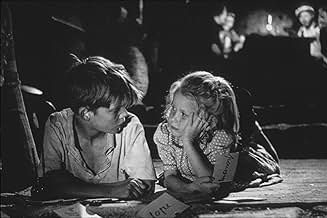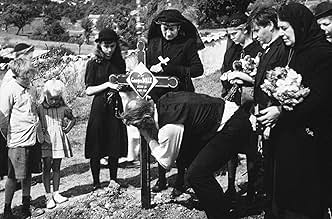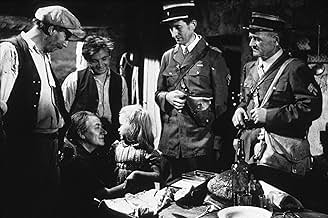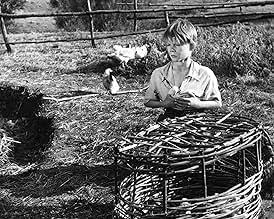IMDb-BEWERTUNG
8,0/10
13.858
IHRE BEWERTUNG
Ein junges französisches Mädchen, das bei einem Luftangriff der Nazis zum Waisenkind geworden ist, ist mit dem Sohn eines armen Bauern befreundet. Gemeinsam versuchen sie sich mit der Realit... Alles lesenEin junges französisches Mädchen, das bei einem Luftangriff der Nazis zum Waisenkind geworden ist, ist mit dem Sohn eines armen Bauern befreundet. Gemeinsam versuchen sie sich mit der Realität des Todes auseinanderzusetzen.Ein junges französisches Mädchen, das bei einem Luftangriff der Nazis zum Waisenkind geworden ist, ist mit dem Sohn eines armen Bauern befreundet. Gemeinsam versuchen sie sich mit der Realität des Todes auseinanderzusetzen.
- Für 1 Oscar nominiert
- 8 Gewinne & 2 Nominierungen insgesamt
Marcel Mérovée
- Raymond Dollé
- (as Pierre Merovée)
Denise Péronne
- Jeanne Gouard
- (as Denise Perronne)
Marie-Pierre Casey
- Infirmière
- (Nicht genannt)
André Enard
- Le premier gendarme
- (Nicht genannt)
Marcelle Feuillade
- La mère de Paulette
- (Nicht genannt)
Roger Fossey
- Le père de Paulette
- (Nicht genannt)
Empfohlene Bewertungen
Never has the world of adults seemed so utterly stupid, brutal and senseless than through the eyes of two innocent children who have to deal with pain, loss, death and war. And yet, the film is gentle, subtle, inobtrusive in its portrayal of the grown-up's follies, and refreshingly unsentimental about presenting the pain and beauty of childhood.
A masterpiece.
Few other titles come to mind in which child actors have so much to bear, and they manage it effortlessly & unforgettably.
[The only thing that bothers me is the too convincing 'acting' of the dead /?/ dog...]
A masterpiece.
Few other titles come to mind in which child actors have so much to bear, and they manage it effortlessly & unforgettably.
[The only thing that bothers me is the too convincing 'acting' of the dead /?/ dog...]
Wonderfully wry, ribald, and ironic look at children, life, and death in the provinces. This must be one of the best examples of poetic realism much better than any Renoir you'll see it's alive and humane, comprising a hundred little iconic cinema moments and several major ones.
A little girl, whose parents are killed in an air-raid at the beginning, wanders into a nearby farm clutching her dead dog and is taken in. She becomes attached to the boy at the farm and they start to expand her dog's grave into a little cemetery of dead animals. There's nothing macabre or sinister about this, nor (as the blurbs maintain) is it particularly a statement about the effect of war on children - it's simply the sort of thing kids might do. When they start pinching crosses from the real cemetery though, they are in for it.
The peasant family are a hoot. The father has a hilarious running feud with his neighbour; the daughter is having an illicit affair with the neighbour's son; the elder son succumbs to a tragi-comic demise after an innocuous accident; the second is a good-natured hick; and the youngest boy gets clouted by his father at every turn ("Take that!", says the father as he smacks him across the head "...and that!" says his sister as she plonks some flowers into his hand). Their every movement is bursting with rough humour and vitality and we are being shown something interesting in every frame. It comes vividly to life, and as an evocation of childhood is up there with Selznick's Tom Sawyer and "Spirit of the Beehive".
Remarkable performances from the two children. There's no sanctimoniousness or even self-awareness to it; Clement got it down and it came out right.
A little girl, whose parents are killed in an air-raid at the beginning, wanders into a nearby farm clutching her dead dog and is taken in. She becomes attached to the boy at the farm and they start to expand her dog's grave into a little cemetery of dead animals. There's nothing macabre or sinister about this, nor (as the blurbs maintain) is it particularly a statement about the effect of war on children - it's simply the sort of thing kids might do. When they start pinching crosses from the real cemetery though, they are in for it.
The peasant family are a hoot. The father has a hilarious running feud with his neighbour; the daughter is having an illicit affair with the neighbour's son; the elder son succumbs to a tragi-comic demise after an innocuous accident; the second is a good-natured hick; and the youngest boy gets clouted by his father at every turn ("Take that!", says the father as he smacks him across the head "...and that!" says his sister as she plonks some flowers into his hand). Their every movement is bursting with rough humour and vitality and we are being shown something interesting in every frame. It comes vividly to life, and as an evocation of childhood is up there with Selznick's Tom Sawyer and "Spirit of the Beehive".
Remarkable performances from the two children. There's no sanctimoniousness or even self-awareness to it; Clement got it down and it came out right.
A classic French foreign film, one of the best. A necessity for every foreign film lover's video library, along with Cinema Paradiso and Life Is Beautiful. This film haunts you and stays with you long after the film flashes its "finis". Part of this is due to the musical soundtrack, with its romantic guitar melodies, part of it has to do with the sadness of the storyline....the little girl's losing her parents and beloved dog early in the picture, but mostly the film lingers in your heart because of the outstanding performances by the child actors in this film, Georges Poujouly who plays Michel, and especially Brigitte Fossey as Paulette. Her little innocent face expresses all the horrors and trauma of war, what all the millions of children must have felt who were caught up in the barbarism of World War Two, when the security of a loving home was pulled out from under them. Never has the agony of a human being's suffering been so well captured on film, and I think Brigitte was all of six years old when she performed in this movie. A remarkable feat.
I am incapable of writing reams about films I admire because words do no justice to the magic they conjure.
FORBIDDEN GAMES left me speechless when I first saw it two decades ago.
It is ABOUT two French children, a peasant boy, a Parisian girl, who become close friends as World War 2 ravages Europe.
The film LOOKS at the way warfare effects the innocent and transforms one's view of death.
Director Rene Clement sets the story in a rural village and peoples his story with some of the most authentic characters ever to tred the silver screen. He employs humour, horror and humanism to tell his story and solicits an incredible performance from moppet Brigitte Fossey.
It's a tearjerker, too, it's emotionally delicate, and it's perfectly manipulated drama -- all good drama is.
Its power is its apparent simplicity.
A love letter to cinema that is also one of the greatest and most haunting war movies ever made.
The imagery and the heart-rending music score will remain with you forever.
FORBIDDEN GAMES left me speechless when I first saw it two decades ago.
It is ABOUT two French children, a peasant boy, a Parisian girl, who become close friends as World War 2 ravages Europe.
The film LOOKS at the way warfare effects the innocent and transforms one's view of death.
Director Rene Clement sets the story in a rural village and peoples his story with some of the most authentic characters ever to tred the silver screen. He employs humour, horror and humanism to tell his story and solicits an incredible performance from moppet Brigitte Fossey.
It's a tearjerker, too, it's emotionally delicate, and it's perfectly manipulated drama -- all good drama is.
Its power is its apparent simplicity.
A love letter to cinema that is also one of the greatest and most haunting war movies ever made.
The imagery and the heart-rending music score will remain with you forever.
This great film has been well-described here and elsewhere, and I don't know that there's a lot more to be said about its worth. It made a great impression on me when I first saw it in an English-dubbed version on late night TV many years ago, and it has always been a favorite of mine since then.
But it seems there's often a bit more to learn about an old favorite film. In this case, I acquired a foreign DVD edition of "Les Jeux interdits" which contained, besides some interesting outtakes, a later-deleted prologue and epilogue to the film which I had never heard of before. These did not have English subtitles, so I had to guess what was being said, but Clement's direction and the acting of young Fossey and Poujouly are so good that I could follow almost all of it without knowing very much French at all. They establish a sort of framing device for the story, in that the plot of the film is in fact a story from a book being read by the boy to the girl. In the prologue we see Fossey and Poujouly, not dressed in grimy peasant clothes at all, but clean, scrubbed, and in their Sunday-best, sitting on a log over a stream. The boy begins reading the story of Paulette and Michel out of the book, and we fade into the film as we now know it, beginning with the refugees on the road. After the sad ending of the story, we fade back to the epilogue, where the boy has just finished reading. The heartbreaking ending of the story has the girl in tears of despair. So the boy, in an act of kindness to her, pretends to read a blank page at the end of the book and makes up a happy ending to the story to dispel her grief.
I guess I can see why it might have been deleted later, as it tends to soften the force of the central narrative a bit and the devastating sadness of its ending. But it really is a beautiful and touching bit of film, and I'm very happy to have a chance to see it, as I don't think it's been seen much over the years, or that many fans of this film are even aware of it.
The outtakes are quite interesting as well, as they show some alternate takes of familiar scenes, including the snapping of that little blackboard thing with the title of the film at the start of the shots (what's that thing called, anyway?). There is also some footage of the old owl in the rafters of the mill, in which you can occasionally see Clement coming into the frame to turn the owl's head around toward the camera when it keeps turning away.
With or without the missing prologue and epilogue this is a great masterpiece that you should experience.
But it seems there's often a bit more to learn about an old favorite film. In this case, I acquired a foreign DVD edition of "Les Jeux interdits" which contained, besides some interesting outtakes, a later-deleted prologue and epilogue to the film which I had never heard of before. These did not have English subtitles, so I had to guess what was being said, but Clement's direction and the acting of young Fossey and Poujouly are so good that I could follow almost all of it without knowing very much French at all. They establish a sort of framing device for the story, in that the plot of the film is in fact a story from a book being read by the boy to the girl. In the prologue we see Fossey and Poujouly, not dressed in grimy peasant clothes at all, but clean, scrubbed, and in their Sunday-best, sitting on a log over a stream. The boy begins reading the story of Paulette and Michel out of the book, and we fade into the film as we now know it, beginning with the refugees on the road. After the sad ending of the story, we fade back to the epilogue, where the boy has just finished reading. The heartbreaking ending of the story has the girl in tears of despair. So the boy, in an act of kindness to her, pretends to read a blank page at the end of the book and makes up a happy ending to the story to dispel her grief.
I guess I can see why it might have been deleted later, as it tends to soften the force of the central narrative a bit and the devastating sadness of its ending. But it really is a beautiful and touching bit of film, and I'm very happy to have a chance to see it, as I don't think it's been seen much over the years, or that many fans of this film are even aware of it.
The outtakes are quite interesting as well, as they show some alternate takes of familiar scenes, including the snapping of that little blackboard thing with the title of the film at the start of the shots (what's that thing called, anyway?). There is also some footage of the old owl in the rafters of the mill, in which you can occasionally see Clement coming into the frame to turn the owl's head around toward the camera when it keeps turning away.
With or without the missing prologue and epilogue this is a great masterpiece that you should experience.
Wusstest du schon
- WissenswertesIn a television interview ("Vivement Dimanche Prochain", France 2, 17 April 2005) Brigitte Fossey, who played the little Paulette, revealed that the film had originally been shot as a short, and then it was later decided to extend it into a feature film. Unfortunately she had lost her milk teeth and Georges Poujouly (who plays the boy Michel) had had his hair cut to play in Wir sind alle Mörder (1952). So, in many scenes of the movie Paulette has false teeth and Michel is wearing a wig.
- PatzerThe poor parents are killed by a Focke-Wulf 190. This kind of plane didn't exist at the moment of the "battle of France" in May and June 1940.
- Crazy CreditsThere are two alternate opening credits:The main credit starts with a story book and a female hand opens the book to reveal the credits. The alternate still has the same book but this time we are introduced to the two main characters who are sitting by a lake. In this version, Michel's hand is turning the page and in between the scenes he tells Paulette that he's going to tell a story.
- VerbindungenFeatured in Le ciné-club de Radio-Canada: Film présenté: Jeux interdits (1959)
Top-Auswahl
Melde dich zum Bewerten an und greife auf die Watchlist für personalisierte Empfehlungen zu.
- How long is Forbidden Games?Powered by Alexa
Details
- Erscheinungsdatum
- Herkunftsland
- Offizieller Standort
- Sprache
- Auch bekannt als
- Forbidden Games
- Drehorte
- Produktionsfirmen
- Weitere beteiligte Unternehmen bei IMDbPro anzeigen
Box Office
- Bruttoertrag in den USA und Kanada
- 33.284 $
- Eröffnungswochenende in den USA und in Kanada
- 4.316 $
- 26. Apr. 2015
- Weltweiter Bruttoertrag
- 33.897 $
- Laufzeit
- 1 Std. 26 Min.(86 min)
- Farbe
- Seitenverhältnis
- 1.37 : 1
Zu dieser Seite beitragen
Bearbeitung vorschlagen oder fehlenden Inhalt hinzufügen





























